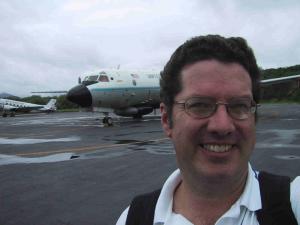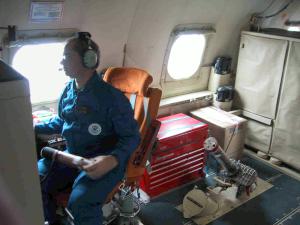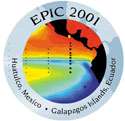|
Where is the Brown?
ETL EPIC Page
SPONSORS
US CLIVAR
NSF
NOAA
WEBSITES
EPIC Program
EPIC2001
JOSS Field Catalog
DOCUMENTS
Program Document
Operations Plan
Cruise Instructions
Stratocumulus Study
ITCZ Subproject
PACS Report
ETL PARTICIPANTS
Air-Sea Interaction
Clouds and Aerosols
Radar Research
Satellite Research
ETL INSTRUMENTS
Mini-MOPA Doppler Lidar
MM Cloud Radar
MM Cloud Radar Data
Reports from the Field
Janet Intrieri
John Bates
Teachers' at Sea
|
 |
 |
 |
Reporting from Huatulco, Mexico

|
| John Bates with NOAA P3 in the backround. |
EPIC flights out of Huatulco, Mexico have started. Thus far, there have
been 4 successful flights each by the NOAA P3 and the NCAR C-130. Three
of the flights has concentrated on sampling cloud microphyusics,
convection, and atmospheric structure of the eastern Pacific
intertropical convergence zone (ITCZ) near longitude 95W. These flights
have sampled a variety of conditions including a passing easterly wave,
supressed convective conditions, and very active conditions. We are
interested in sampling a variety of conditions in order to improve out
understanding and forecasting of the eastern Pacific ITCZ.

|
| Jeff Smith aboard the NOAA P3 prepares to launch a dropsonde.
|
The forth flight consisted of a long flight along longitude 95W to
sample air-sea interactions. air-sea interactions vary greatly along
this latitude from 10N, where we find very warm SSTs and deep
convection, to the equator, where we find relatively cool SSTs and low
stratiform cloudiness. This mission was also highly successful,
sampling this wide range of conditions and the C-130 aircraft making it
all the way down to 1S.
Missions continue this week in coordination with the R/V Ronald Brown
which will be on station this Thursday.
|


